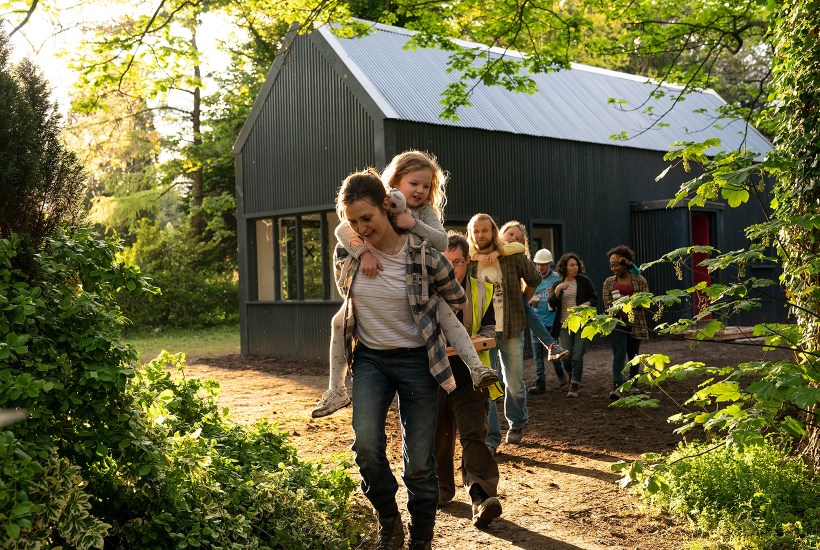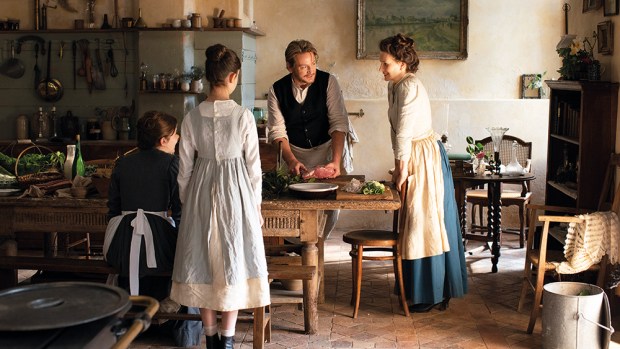Herself is an intensely powerful film about domestic violence that isn’t Nil By Mouth or The Killer Inside Me or any of the other films that have you begging: ‘Oh, sweet Jesus, please make this stop.’ Actually, it starts like that, but then becomes something else — something that never loses sight of why we’re here but is also an uplifting tale about a woman who wants to rebuild her life by building a home. And now I’ve made it sound like some cheesy, feelgood monstrosity. Trust me, it isn’t.
Herself is produced by Sharon Horgan and directed by Phyllida Lloyd (The Iron Lady, the Mamma Mia! franchise) because women make films from top to bottom these days. Get over it. (Below-the-line commenters: I said this just to bait you. Bite if you must.) The film stars the Irish actress Clare Dunne, who co-wrote and plays the lead role of Sandra. She is married to Gary (Ian Lloyd Anderson) and they have two little daughters. In the opening scene Sandra is happily hanging out with the girls when Gary returns from work. The atmosphere instantly changes. He’s found a roll of cash hidden in the car, which he (rightly) assumes is Sandra’s escape money, and explodes with anger and violence. This scene is absolutely horrific to watch — ‘oh, sweet Jesus, please make it stop’ — and we know it’s not the first time it’s happened. Next, we find she has left Gary, thank God, but is living in a grim hotel room miles from her daughters’ school with little chance of being rehoused by the council.
In Ken Loach’s hands this would spiral from bad to worse as Sandra negotiates the Kafka-esque government agencies. There is a bit of that, but it doesn’t get bogged down there. Inspired by one of her daughter’s bedtime stories, Sandra starts thinking about building her own house. Nothing fancy. It would be a ‘tiny house’, at a cost of £35,000, but perfectly liveable and there are YouTube videos on it. Sandra works as a cleaner for a doctor (Harriet Walter) who is grouchy but then not so grouchy, conveniently. She offers Sandra the land at the back of her garden — it is a very big garden — and to lend her the money.
Sandra’s defiance and determination wins admirers and a community comes together to help. This includes a group of local squatters, another parent and Aido (Conleth Hill), a builder who is initially reluctant but then proves a mensch. (Spoiler alert: not all the men in this film are terrible.)
This is an underdog-against-all-the-odds narrative and it could have been horrible. It could have been Seabiscuit, with joists and concrete mixers. It could have been (Not So) Grand Designs with a weepy back story. But this is never maudlin and never tips into sentimentality. Lloyd’s direction is so sure and restrained that she somehow manages to balance the raw, hard-hitting, viscerally impactful scenes with the lighter, hopeful ones. It does not trivialise. Gary always looms. Even when Gary says ‘I’m having counselling’ and ‘I’ve changed’, he throbs with menace and is clearly poised to strike.
This tension persists throughout, and you often won’t see what’s coming next. There’s a scene with Gary’s mother that catches you wholly off guard. The ending, meanwhile, does not take the easy way out. (I wish it did!) True, there are some unlikely plot points and some of the secondary characters are barely drawn, but Dunne’s performance is extraordinary. She so convincingly inhabits Sandra that her fear becomes our fear, her pain becomes our pain, and we root for her as if our life depends on it.
Lastly, yes, men can be victims of domestic abuse too, but 92 per cent of perpetrators are male. Just thought I’d get that in first.
Got something to add? Join the discussion and comment below.
Get 10 issues for just $10
Subscribe to The Spectator Australia today for the next 10 magazine issues, plus full online access, for just $10.
You might disagree with half of it, but you’ll enjoy reading all of it. Try your first month for free, then just $2 a week for the remainder of your first year.














Comments
Don't miss out
Join the conversation with other Spectator Australia readers. Subscribe to leave a comment.
SUBSCRIBEAlready a subscriber? Log in